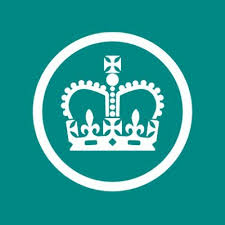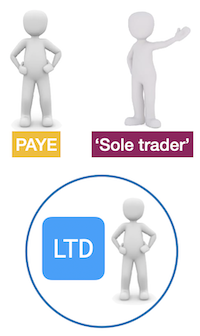Tax latest for freelancers
Last Updated on 18 November 2022

If you’re a freelancer it’s good to think like a business, and part of that is keeping an eye on how tax works. You can sometimes save a bit of money just by tweaking your behaviour across different tax years.
Yesterday (17 November 2022) Chancellor Jeremy Hunt unveiled the latest plans to deal with the UK’s financial woes.
I won’t go through all the stuff you’ll find in the usual news outlets or Money Saving Expert, but it’s worth highlighting some of the things that might affect creative freelancers, whether working PAYE, as a sole trader or running a one-person limited company.
If you’re not sure which type of freelancer you are, read this short guide with an explanation of the icons:
What is a freelancer? >
Don’t forget, nearly all these measures come in from April 2023. Nothing changes overnight.
Income tax announcements

The most eye-catching change is the point at which people pay 45% on their earnings. This threshold will be reduced from £150,000 to £125,140.
So if you are earning more than £125,140 next year in PAYE income or sole trader profits (or a mixture of both), your tax bill will go up.
For the rest of us the rate of tax won’t go up, but all the thresholds for income tax and national insurance will be frozen until April 2028.
This will make us all feel poorer, as inflation erodes the spending power of what we keep. For example, you still have a tax free personal allowance of £12,570 per year. But inflation means that money is worth less.

This is your regular reminder that the personal allowance and national insurance rates are UK-wide. But Scotland sets its own tax bands.
There will be a Scottish budget announcement on 15th December 2022.
National Insurance

The biggest change is for sole traders. The weekly Class 2 amount jumps by 10.1% up to £3.45 per week. This is the type of NI contribution that actually gives sole traders an NI record, so it’s important.
Here’s the relevant bit of the statement via gov.uk…
Sole traders pay this at the end of the year through the tax return system. If you’ve been registered as a sole trader for the full 52 weeks of the year your NI class 2 bill after April 2024 will be £179.40. That’s quite a bit more than this year’s £163.80.
Specifics for limited company freelancers

You’ll see a lot of headlines about the rate of corporation tax going up from 19% to 25% in April 2023.
In fact this is for companies with profits more than £250,000. For the rest the tax rate will still be 19%, which is good news for the kind of company freelancer I meet!
But…
Perhaps of more significance for limited company freelancers is the reduction in the Dividend Allowance.
At the moment (2022) there’s a tax-free dividend allowance of £2000. This will be reduced from £2,000 to £1,000 from April 2023, and then to £500 from April 2024.
For some limited company freelancers this will mean getting the calculator out (or talking to your accountant) to work out whether it’s worth moving some money out of your company before April 2023.
VAT – no change
The point at which a business (sole trader or company) has to become VAT registered will remain unchanged until at least April 2026. It’s still £85,000 turnover in any 12 month period.
This will drag more businesses into the VAT system as they put their prices up.
I still think a future chancellor will try to reduce the VAT registration threshold to nearer £25,000 some time after 2026.
The UK has a very high registration threshold compared to other countries. The stats show that this acts as a disincentive for small businesses to grow.
Anything else?
Looking on a more macro level, tucked away in the Treasury’s documents is a statement about maintaining incentives for the audio-visual industries.
Consultation on reforming the audio-visual creative reliefs – The government is seeking to build upon the success of the audio-visual subset of the creative industry tax reliefs, covering film, animation, high-end TV, children’s TV and video games. The government will consult on a series of proposals that will go further to incentivise the production of culturally British content and support the growth of the audio-visual sectors, ensuring these highly skilled industries continue to thrive in the UK.
https://www.gov.uk/government/publications/autumn-statement-2022-documents
Please don’t ask me what ‘culturally British content’ means.
Help!
If all this is getting you down, please don’t forget that the wonderful Film and TV Charity is there to help if you work in those industries:
filmtvcharity.org.uk/your-support/financial-support/cost-of-living-crisis/

NB: David Thomas Media Ltd is not responsible for the content of other sites nor any financial advice provided by them.
Posted on 18 November 2022



